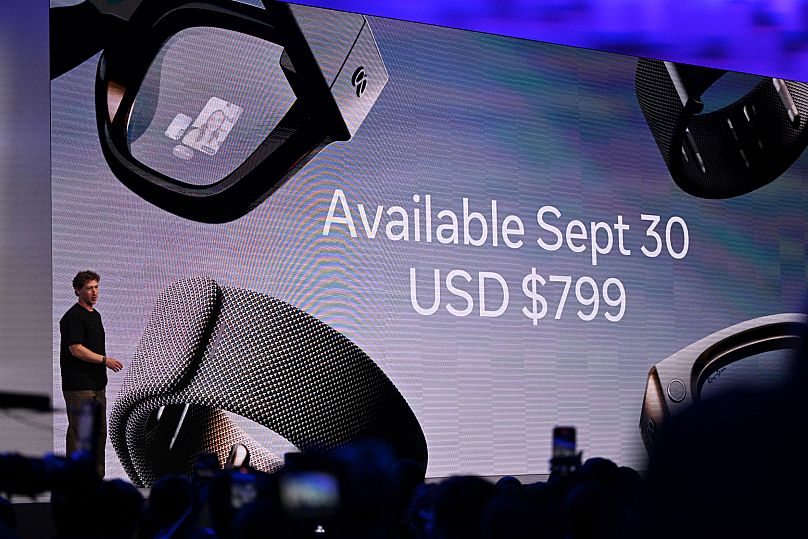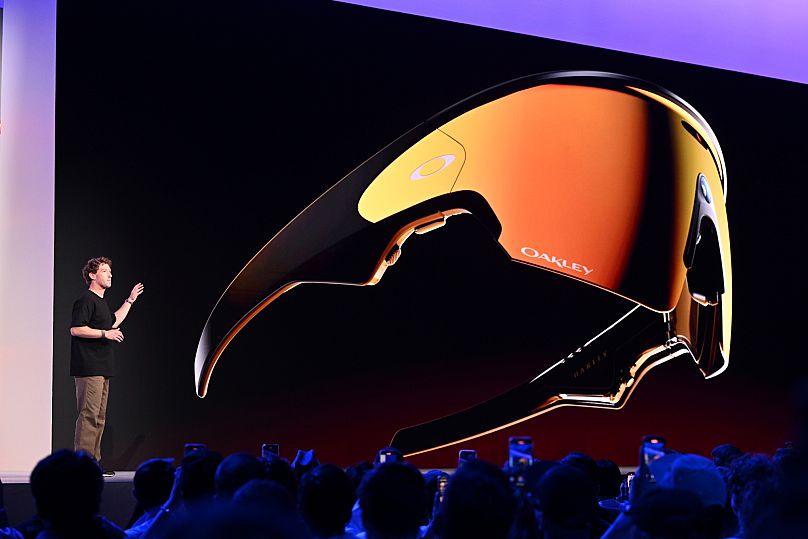
Meta has unveiled its latest Ray-Ban artificial intelligence-powered smart glasses that have all the upgrades, but most interestingly, have a tiny display to watch videos and see texts, as well as a wristband that controls the glasses.
Here are all the latest releases from the company unveiled at its Meta Connect 2025 event overnight.
An alternative to the smartphone?
The AI smart glasses now have a tiny display and a neural wristband that picks up on subtle hand gestures, which allows users to control the device with their hand movements.
Meta CEO Mark Zuckerberg said that users can control the wristband with “barely perceptible movements”. The wristband is called the Meta Neural Band.
“Glasses are the only form factor where you can let AI see what you see, hear what you hear” and eventually generate what you want to generate, such as images or video, he added, speaking at the tech giant's Menlo Park, California, headquarters.

The so-called Meta Ray-Ban Display glasses will be available Sept. 30 and cost $799 in the United States.
The new glasses allow users to watch videos through the display and even see and respond to text messages, Zuckerberg said.
But the display doesn’t block a person’s view and disappears when it’s not being used.
The new smart glasses are a bridge between the company’s audio-only Ray-Ban Meta smart glasses and the experimental Orion augmented reality glasses that the company revealed at last year’s Connect event. Orion can overlay 3D visuals over a person’s real-world field of view with the help of a wireless computing puck, but the glasses are expensive to make and not yet available to consumers.
Orion and ‘superintelligence’
Meta teased a prototype for Orion, which Zuckerberg called “the most advanced glasses the world has ever seen,” last year — but these holographic augmented reality glasses are still years away from reaching the market.
Like other tech companies, Meta has been making massive investments in AI development and hiring top talent at eye-popping compensation levels.
In July, Zuckerberg posted a note detailing his views on “personal superintelligence” that he believes will “help humanity accelerate our pace of progress”.
While he said that developing superintelligence is now “in sight,” he did not detail how this will be achieved or exactly what “superintelligence” means. The abstract idea of “superintelligence” is what rival companies call artificial general intelligence (AGI).
Zuckerberg has said he believes AI glasses are going to be “the main way we integrate superintelligence”.
Upgrades to the old
Meta also updated its original, display-less Ray-Ban glasses to have a better battery life. Meta says the battery lasts eight hours with typical use, nearly twice as long as the previous model.
There will also be a feature called “conversation focus,” which will amplify the voice of the person the user is speaking to and help drown out background noise.
This will also be available on the older version of the glasses as a software update, Zuckerberg said.
There are also new languages added to the live translation feature, including German and Portuguese. The new model costs $379, and the previous model now costs $299.
The Oakley Meta smart glasses
Meta also unveiled a new set of AI-powered glasses for athletes, called the Oakley Meta Vanguard, which the company says is specifically for “high-intensity sports” and can be integrated with Garmin devices to give users feedback about their workouts, such as their heart rate and stats.
For instance, a runner could ask “Hey Meta, what's my heart rate?” and get a voice response through the glasses. It also auto-captures video clips when the user hits key milestones or ramps up their heart rate, speed, or elevation. The glasses will cost $499 and go on sale Oct. 21.

While the company has not disclosed sales figures of the glasses, it said they have been more popular than expected.
“For more than a decade, Zuckerberg’s long-term vision with Oculus and the Metaverse has been that glasses and headsets will blur the lines between physical and digital worlds,” Forrester analyst Thomas Husson said. “After many false starts, the momentum to move beyond an early adopter niche is now”.







